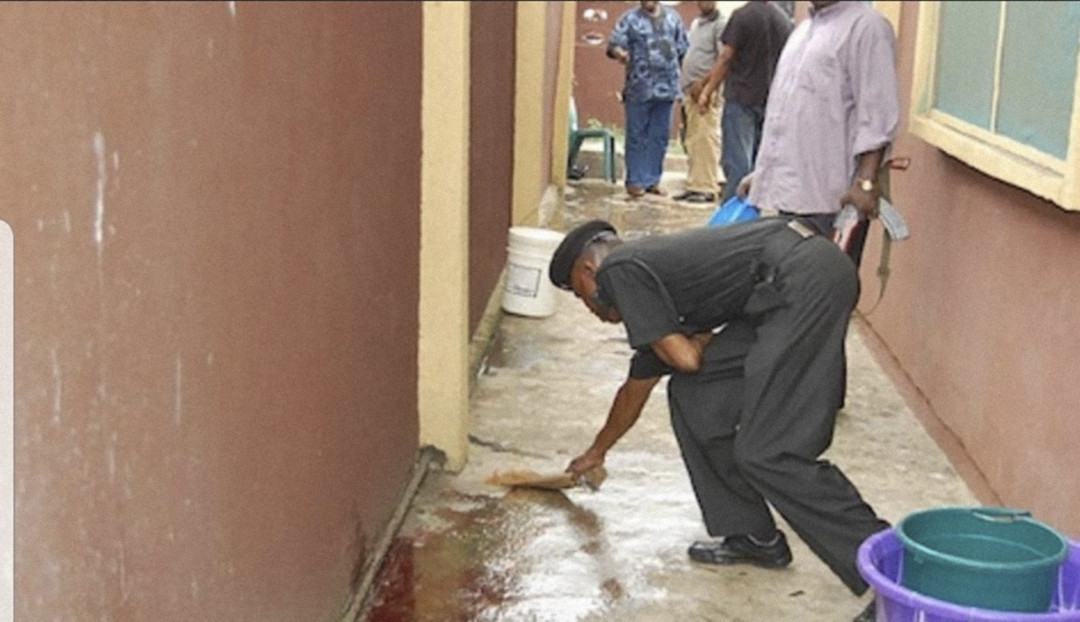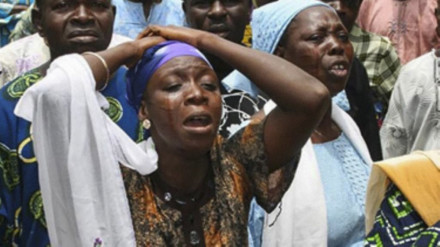20 September 2009
Akowonjo, Lagos State, Nigeria
Bayo Ohu
Profession
Media
Motive
Exposure of illegal activity
Political dissent
Whistleblowing


Adolfo Olivas


Ahmed Divela


Amit Jethwa


Artan Cuku


Babita Deokaran


Bayo Ohu


Berta Cáceres


Bhupendra Veera


Bill Kayong


Boris Nemtsov


Boško Buha


Chai Boonthonglek


Charl Kinnear


Chut Wutty


Chynybek Aliev


Cihan Hayirsevener


Daphne Caruana Galizia


Darío Fernández


Derk Wiersum


Deyda Hydara


Édgar Quintero


Edmore Ndou


Edwin Dagua


Federico Del Prete


Fernando Villavicencio


Gezahegn Gebremeskel


Gilles Cistac


Habibur Mondal


Igor Alexandrov


Jacob Juma


Ján Kuciak


Javier Valdez


Joannah Stutchbury


José Ángel Flores


Jules Koum Koum


Kem Ley


Luis Marroquín


Mahamudo Amurane


Marcelo Rivera


María Elena Ferral Hernández


Marielle Franco


Milan Pantić


Milan Vukelić


Muhammad Khan


Nelson García


Nihal Perera


Oliver Ivanović


Orel Sambrano


Perween Rahman


Peter R. de Vries


Rajendra Singh


Salim Kancil


Sandeep Sharma


Sikhosiphi Radebe


Slaviša Krunić


Soe Moe Tun


Victor Mabunda


Virgil Săhleanu


Wayne Lotter


Yuniol Ramírez


Zezico Guajajara
20 September 2009
Akowonjo, Lagos State, Nigeria
Profession
Media
Motive
Exposure of illegal activity
Political dissent
Whistleblowing
When Bayo Ohu answered the knock on his door while he was preparing to go to church that fateful Sunday morning of 20 September 2009, little did he know that it was assassins coming for his soul. As he opened the door, the armed assailants wasted no time in shooting Ohu, in front of his two children. He died later in hospital.
Aged 45 at the time of his death, Ohu was assistant news editor of The Guardian, an independent Lagos daily. According to the Nigerian Union of Journalists, the murder was a hit: Ohu was targeted, they said, for his political reporting. They believe the murder is related to a media investigation he was working on into alleged fraud in the Nigeria Customs Service and his reporting of the Ekiti State elections, which had been marred by anti-media violence.
His wife, Blessing, confirmed his death was linked to an alleged fraudulent certificate issued by a recently appointed customs official, information she acquired from The Guardian.
Blessing spoke of the nonchalant attitude of the Nigerian police towards her late husband’s death: ‘One policeman came to ask me about a particular cell phone and if it belonged to my husband. I looked at the phone and told him it was not my husband’s and he left. Then, after three days, another set of policemen came, sent by the inspector general [the police chief] to console us. That is all I have had from the police.’
Blessing is convinced the police did not do enough to find her husband’s killer. Yinka Odumakin, spokesman for socio-cultural organization for the Yoruba people, Afenifere, was also curious about why the assailants took away Ohu’s laptop. Odumakin said the police ought to interrogate the then Comptroller-General of the Nigeria Customs Service, Abdullahi Dikko, over Ohu’s murder – especially given his press stories about Dikko, and because there have been previous accusations of misconduct against Dikko. According to Ayodele Samuel, a Nigerian activist, an individual called Olajide Ibrahim swore an oath through his lawyer, Festus Keyamo, that he had forged certificates for Dikko in 1995.
Although three men were later accused of the murder, like many similar killings in Nigeria Ohu’s assassination has remained unresolved, and none of the authorities seems to be concerned, regardless of how the family of the slain journalist feels. A UNESCO publication reports that, like Bayo Ohu, journalists Godwin Agbroko, Paul Abayomi Ogundeji, Zakariya Isa, Nansok Sallah, Enenche Akogwu and Ikechukwu Udendu, were all killed, and yet the status of the investigations into their deaths was not available because Nigeria had not acknowledged or responded to UNESCO’s official request to provide information.
In Nigeria, as elsewhere, leaving such killings uninvestigated only emboldens other criminal syndicates, often allegedly headed by high-ranking state elites, in their activities. As long as the government and the police turn a blind eye, there are bound to be many more like Bayo Ohu who will be snatched from their loved ones for daring to challenge the power of organized syndicates. Former Nigerian president Olusegun Obasanjo, upon leaving office in 2007, had alleged that the killers of former Attorney-General of Nigeria Chief Bola Ige, murdered in 2001, were drug barons he was about to expose. And, more recently, the intimidatory power wielded by Nigeria’s criminal networks has seen a highly performing governor of Lagos State, Akinwunmi Ambode, drop his bid for a second term after former governor Bola Tinubu, who enjoys the patronage of political thugs in Lagos, bullied him out of the race.
Bayo Ohu was laid to rest on 25 September 2009 in his home town, Iseyin, Oyo State. Yet justice has not been concluded in the same way. A former police officer, Ogbonna Onovo, confirmed that the police claimed his murder was a simple case of armed robbery on the basis of possessions that had been taken at the time of the murder. Two phones were later recovered; however, his wife confirmed they were not his. Many suspect that Ohu was targeted because of his line of work.

Scene of the murder

Sympathizers at Ohu's buria
The failure of the police to provide a concerted response around the case is further emphasised by the fact that in 2012 the Lagos Sate High Court, headed by Justice Latifa Okunnu, set free Ohu’s suspected killers, Ganiu Sulemon, Idris Balogun and Dada Adesanya, citing insufficient evidence and unavailability of witnesses. The three had been charged with conspiring to murder and murder. The judge referred to an absence of police witnesses submitted by the prosecution. In her words, ‘They abandoned the case and did not turn up,’ denying the court evidence needed to convict the men.
This lack of fidelity to the law by the Nigerian authorities seems to be a never-ending cycle. In 2016, when the federal government decided to reopen the case of Bola Ige and similar high-profile killings, an inquiry never materialized. Meanwhile, for those whose case files were reviewed, it is the same old story: no progress. All the while, Nigeria’s organized-crime-related killings continue.
Talented journalists will continue to leave Nigeria and other countries where organized-criminal cartels can source hired assassins to carry out killings of media professionals, like Ohu. Those who remain and continue their investigative work do so at their own risk. When Nigerian Nobel Prize-winning writer and activist Wole Soyinka described the then ruling People’s Democratic Party as ‘a nest of killers’, he probably meant it in a wider context – that no one is safe in a country where defending the truth, or voting against a certain party or individual in an election, is seen as a crime that carries a street verdict of death.
As the Nigerian government looks the other way, some individuals have chosen to step in and offer support to the families of the bereaved. In December 2012, the Richard Akinnola Foundation, set up to support the families of murdered journalists, presented a cash donation to Ohu’s widow. But no matter how much is given to such families, it can never bring back their loved ones, whose sole ‘offence’ was trying to right the wrongs of their society through the power of the pen.


16 January 2019
Accra, Ghana
Ahmed Divela


23 August 2021
Johannesburg, South Africa
Babita Deokaran


18 September 2020
Cape Town, South Africa
Charl Kinnear


16 December 2004
Kanifing, Gambia
Deyda Hydara


22 April 2017
Beitbridge District, Zimbabwe
Edmore Ndou


21 April 2018
Johannesburg, South Africa
Gezahegn Gebremeskel


3 March 2015
Maputo, Mozambique
Gilles Cistac


5 May 2016
Nairobi, Kenya
Jacob Juma


15 July 2021
Kiambu, Kenya
Joannah Stutchbury


4 November 2011
Yaoundé, Cameroon
Jules Koum Koum


4 October 2017
Nampula, Mozambique
Mahamudo Amurane


22 March 2016
Mbizana, Eastern Cape, South Africa
Sikhosiphi Radebe


10 January 2018
South Africa
Victor Mabunda


16 August 2017
Dar es Salaam, Tanzania
Wayne Lotter